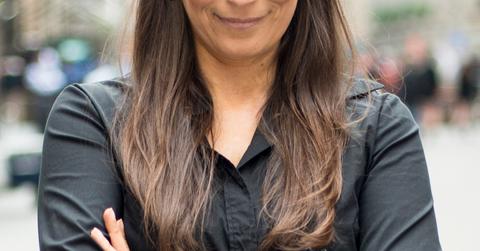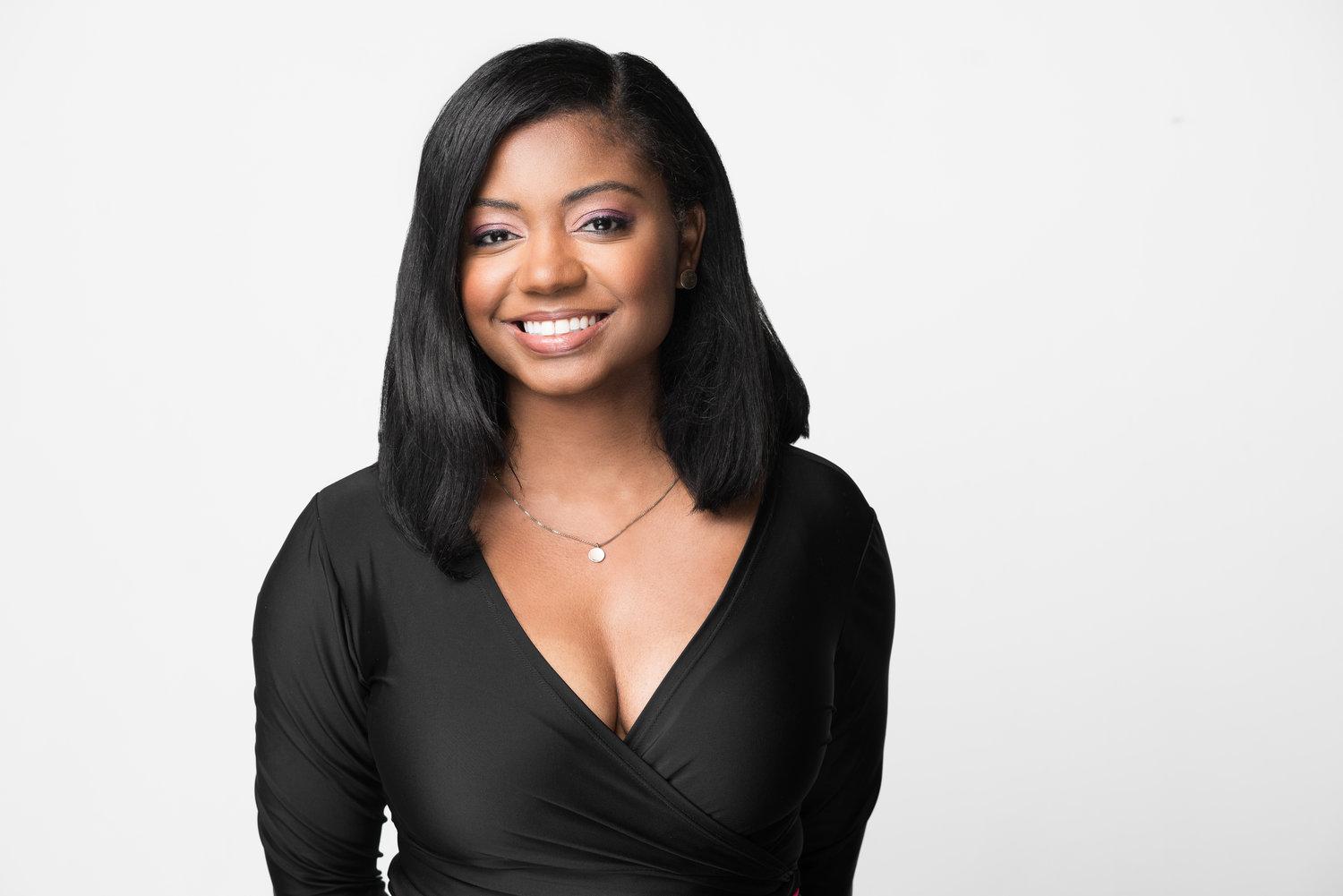Figuring out where to college, or if college is the right choice at all, is a weighty decision for any young person in America today. Once the student is enrolled, an even tougher choice is deciding whether or not to stay.
In 1989, a student of Deborah Bial said, ‘I never would have dropped out of college if I had my posse with me.’ By ‘posse,’ the student essentially meant a support network or group of people to count on. At the time, Debbie was a recent Brandeis University graduate running leadership programs within New York City Public high schools. She was 23 years old.
“That simple idea of sending a team of students together to college so they could back each other up became the core anchor for a program that today is a major leadership development and diversity initiative that has sent close to 7,000 students to college,” Debbie shared with us when reflecting on the moment.
Today, she is the founder and President of The Posse Foundation, a nonprofit that sends Posses (a group of around 10 to 12 students) to some of America’s most elite colleges and universities on full-tuition scholarships.
Posse now operates out of 10 cities with an annual budget of $20 million, and has distributed over $800 million in scholarships from 57 partner colleges and universities including Vanderbilt, Depauw, Cornell, and Syracuse University to name a few.
Over the last 27 years, Debbie grew Posse from a concept to one of the most renowned college scholarship and leadership programs in the United States. Along the way, she’s continued her own education earning master’s and doctoral degrees from Harvard University. Her dissertation earned her a $1.9 million grant from the Andrew W. Mellon Foundation.
Read our interview with Debbie for more insight on how she grew her idea, her advice for today’s leaders and her vision for the next phase of Posse.
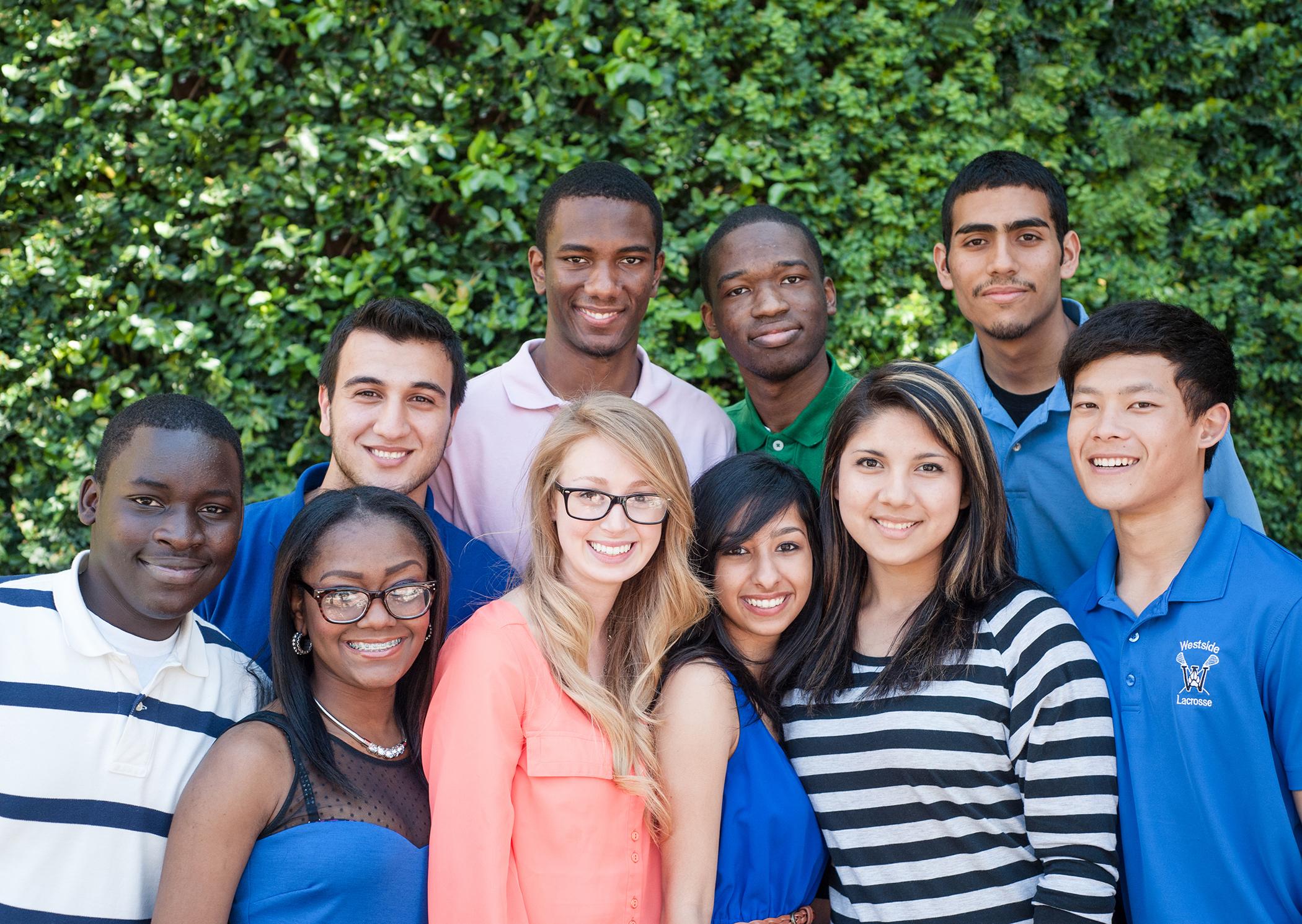
Her Agenda: Going back to when you first started Posse, how old were you at that time and what first steps did you take?
Debbie Bial: I was 23 and I was running leadership programs in public high schools in NYC after school. I got to meet a lot of smart, really ambitious kids. Even though they had these tremendous talents, either [they] weren’t getting connected to really great colleges or they weren’t getting admitted to those schools. Often when they were admitted they were saying forget it. They were leaving. They were going home. They were dropping out. So the idea for the program really started as a way to increase diversity at the elite institutions of higher education which so desperately needed it. This is in the 1980’s and 90’s. It’s really evolved into a program that goes beyond that. The social justice piece of Posse now is focused on thinking about how to expand the definition of merit to include more than a test score. [We want to] really send a message to America that, yes, high test scores are important, but they are not the only way to identify outstanding kids. We need these kids to go to the best schools so they can represent the voices of all Americans in leadership positions. We don’t want a very homogenous group running the country we want a diverse group running a diverse country.
!["[We want to] really send a message to America that, yes, high test scores are important, but they are not the only way to identify outstanding kids. We need these kids to go to the best schools so they can represent the voices of all Americans in leadership positions. We don’t want a very homogenous group running the country we want a diverse group running a diverse country." -Debbie Bial via Her Agenda](https://media.heragenda.com/brand-img/860/0x0/wp-content/uploads/2016/08/Photo-Aug-10-12-35-54-AM.jpg)
Her Agenda: What were the biggest obstacles that you faced in those early days and how did you overcome it?
Debbie Bial: In the beginning, you’re a program that no one’s ever heard of. So, that makes it harder to raise money, harder to get new colleges and universities to sign on, harder to get the word out to students who might apply or get nominated, harder to do everything. [But] you can’t give up. You can never give up when you believe deeply in something. Knowing that you’re not giving up will allow the program space to both develop and to get noticed [which] is really important.
Her Agenda: For most of your career you’ve been a founder. What experiences do you think shaped you to become the founder of an organization like Posse?
Debbie Bial: I don’t think of myself as a founder. I see myself as the President of a nonprofit. I happen to be the founder, I have been here for 27 years. It is very unusual to stay with one organization for that long, but how lucky am I? This is something that is so positive and so fulfilling. I am a very social person and I believe in the value of young people. I think their collective voice, their individual voice, is so important. I remember when my family had dinner, we always had dinner with the four of us. My parents always wanted to know my opinion. Even was I was 9 or 13 or 15, my opinion was always important. I think that’s at the core of Posse. The opinions of young people are hugely important so I get to be in a job that is all about that.
![" In the beginning, you’re a program that no one’s ever heard of. So, that makes it harder to raise money, harder to get new colleges and universities to sign on, harder to get the word out to students who might apply or get nominated, harder to do everything. [But] you can’t give up. You can never give up when you believe deeply in something." -Debbie Bial via Her Agenda](https://media.heragenda.com/brand-img/861/0x0/wp-content/uploads/2016/08/Photo-Aug-10-12-36-28-AM.jpg)
Her Agenda: Do you feel like your family influenced you to be the outspoken person that was able to start something like this and still be in it and sustain it?
Debbie Bial: I do think I was enormously influenced by my parents who believed that the voice of young people was always important. But I was not always outspoken, I am now, very much, but I was not back then. I was shy. I was always a team player and I tried to be diplomatic, to be collaborative, but I didn’t develop my own sense of social justice or my own voice until much later.
Her Agenda: Do you feel there was a key moment where you recognized that you were diluting your voice or that you weren’t really strong in your voice? If so, how did you adjust it?
Debbie Bial: I grew with the organization. It was important to raise money and to design program in the beginning. Now it’s more important that I’m a spokesperson. We now have a staff of 166 people and we have almost 7,000 kids so the leadership piece is much more important. Working with a board, advisory boards, supporters in 10 cities, universities all over the United States. By the way, age plays a role. I turned 50 in May, that’s not an insignificant thing.
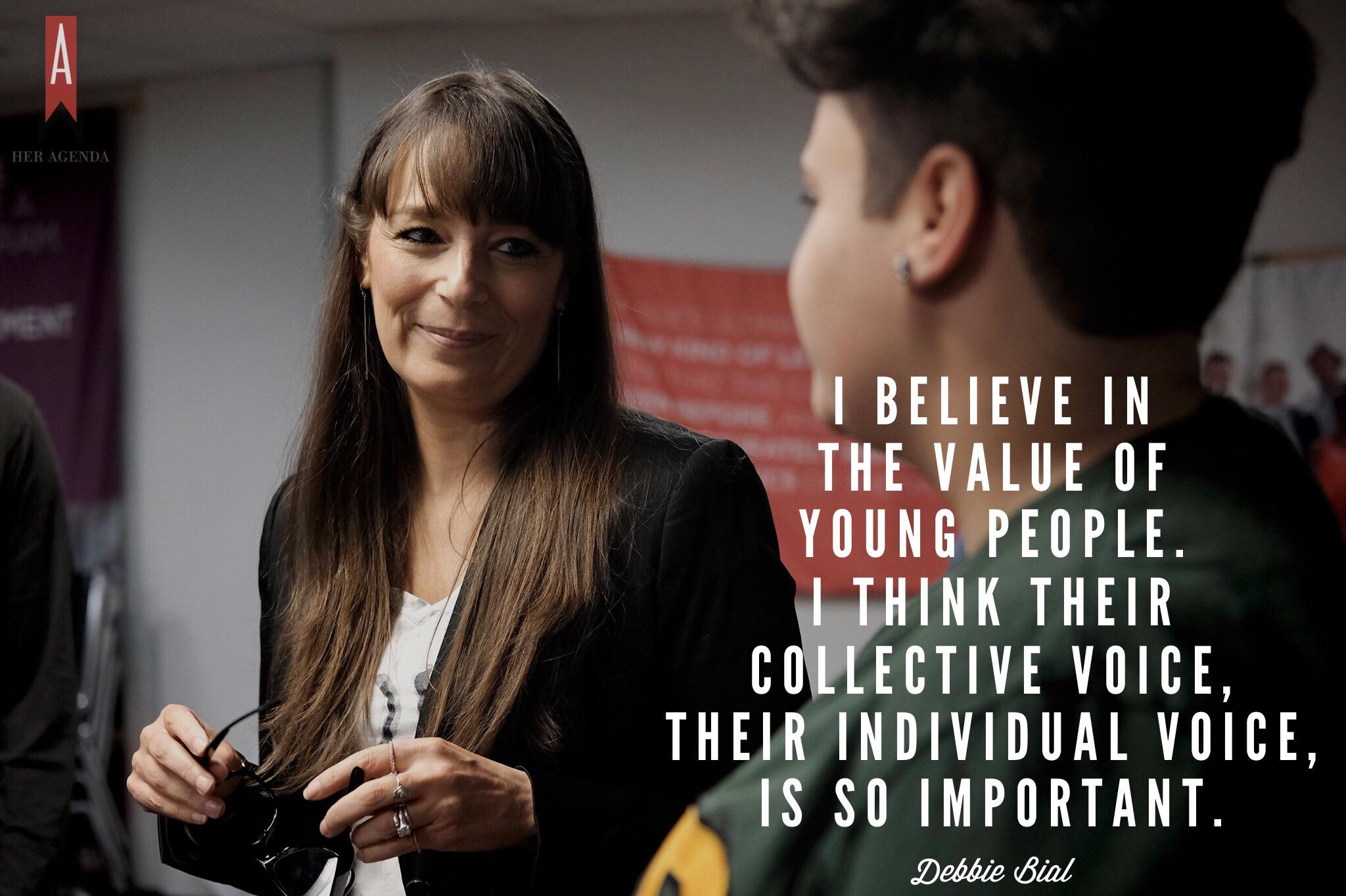
Her Agenda: How do you inspire your leaders and give them that power to carry the vision and the spirit of the organization? What’s key things do you do to make sure all the wheels are turning in the right direction?
Debbie Bial: You can do two really smart things as a leader. One is you can recognize that success is not because of you. You just have the privilege of being in the leadership position in an organization. It’s really important to remember that it’s not because of you, you’re [just] a part of it. It’s because of all the people that are involved. The second thing is that you hire and select the best people you can find, the smartest, the most savvy, the most positive, the people who have great ideas, the people who know how to execute. It’s so important. Posse is so great because we find great students and then they make us look really good.
!["One is you can recognize that success is not because of you. You just have the privilege of being in the leadership position in an organization. It’s really important to remember that it’s not because of you, you're [just] a part of it. It’s because of all the people that are involved. The second thing is that you hire and select the best people you can find, the smartest, the most savvy, the most positive, the people who have great ideas, the people who know how to execute." -Debbie Bial via Her Agenda](https://media.heragenda.com/brand-img/863/0x0/wp-content/uploads/2016/08/Photo-Aug-10-11-40-36-AM.jpg)
Her Agenda: What would you say is the toughest thing about your role as the President of Posse? You said in a New York Times interview that you don’t even feel like a boss and now you said you don’t even say founder. What makes you hesitant to embrace that idea?
Debbie Bial: It’s not like I don’t like to use the term founder, it’s just that I think of my role. When you say you’ve been a founder this whole time, that’s true, but I think of myself more as the role of CEO, as president. Founder is just the lucky thing that I got to be.
The toughest thing is disappointment. Figuring out how to get through disappointment and how to stand behind ideas that haven’t been tested. Those are two really hard things. There might be an idea that hasn’t been tested that you know in your gut is right and your team believes that. You have to stand up for that idea to the board, to your clients or the university partners, the corporate partners or the kids. You have to be able to convince the world that the idea is good. It’s the same exact thing as when Posse started. It seemed like a great idea, you know it’s going to be good. You believe it in your heart and your gut, but no one else has ever heard of it. It’s the hardest thing because sometimes it’s easier to go with the flow or to not do something. It’s harder to say yes, let’s do it. You have to be the one to say absolutely, we will! Not just I think so, I hope so, but WE WILL.
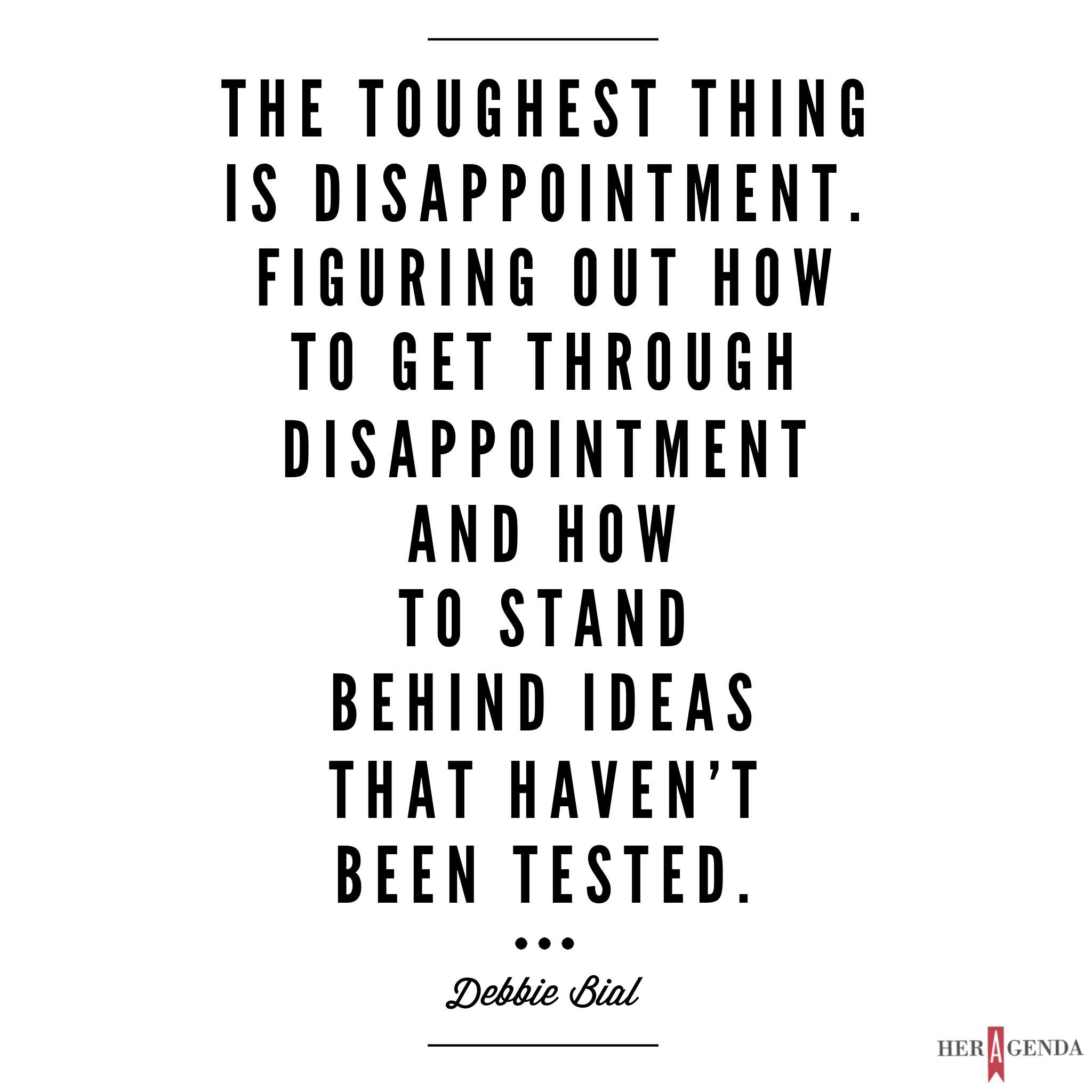
Her Agenda: What would you say is the biggest lesson you learned when it comes to fundraising and money management?
Debbie Bial: The biggest lesson is don’t compromise for the money. Don’t compromise your mission, values, don’t compromise the core direction and strategy of your program. Just don’t compromise. If someone offers you one million dollars, a huge amount of money and says why don’t you do this instead or why don’t you take this direction, but it doesn’t match your mission or strategy, don’t take it.
Her Agenda: Did you ever early on have a fear of asking for money? How did you overcome that?
Debbie Bial: Totally! You just learn that actually people want to give you money. There are so many people out there that want to help who have money and they want to do something good with it. Once you really realize that you understand that it’s not just okay to ask for money, it’s actually a good thing.
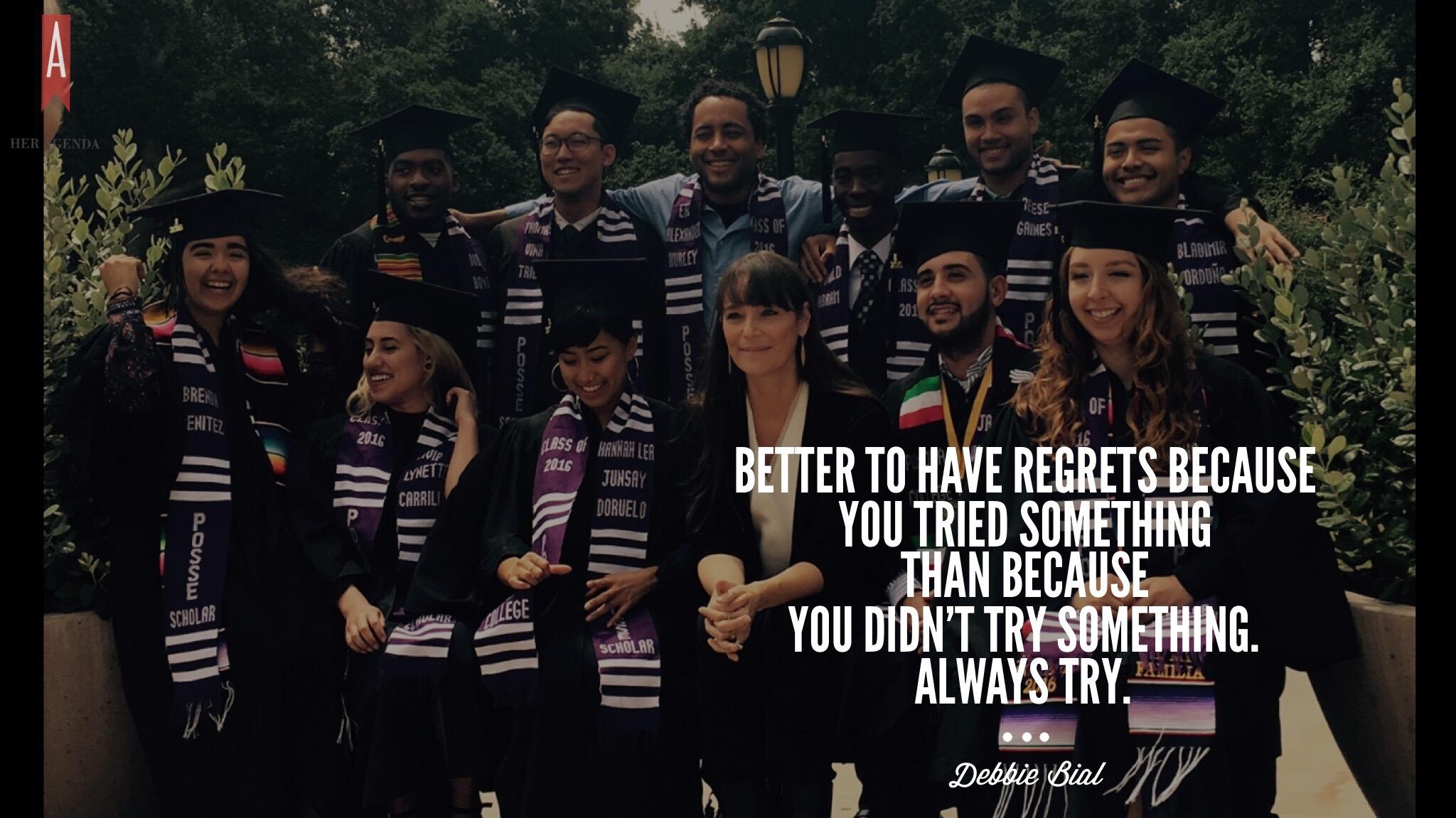
Her Agenda: I want to move to a great honor that Posse received in 2010. President Obama named Posse as one of the 10 nonprofits that he would share his Nobel Peace Prize money. How did you feel when that happened and what do you think put Posse on his radar?
Debbie Bial: The answer is I don’t know. I wish I knew how we got on that list. What I believe is that there have been people who have been connected to or influenced by Posse over the years who are in the White House now or who are connected to the White House. I cried. I was in LA and I got a phone call from the office here in NY and they said, are you sitting down? And they told me that President Obama was going to share his Nobel Peace Prize money. It made me feel like we won some of the Nobel Peace Prize.
Her Agenda: What’s something that you know now that you would tell yourself when you first started your journey?
Debbie Bial: That’s such a Posse question! There’s a lot of things. I would tell myself, don’t have regrets because you didn’t try something. Better to have regrets because you tried something than because you didn’t try something. Always try.
Her Agenda: Do you happen to have a motto or personal mantra that you live by?
Debbie Bial: Live big and try to find capital R romance in your life. The biggest kind of romance, it’s not chocolates, it’s life. It’s that feeling you get when you’re under the big sky and you know life is big and great.

Her Agenda: What’s next your agenda? What’s coming up for Posse?
Debbie Bial: By 2020 Posse wants to have 100 partnerships, which means 1,000 new Posse scholars every year coming into the pipeline. So, that would be 5,000 kids a year in our pipeline. We want to expand our Veterans initiative and our STEM program. We have a brand new consulting arm that lets people outside of the Posse program experience our workshops and retreats. It’s for corporate, for universities that aren’t partners. All of those things are going to be part of the focus for the next five years.
[Editor’s note: This feature was published on August 15th, 2016. It has been edited for length and clarity.]

